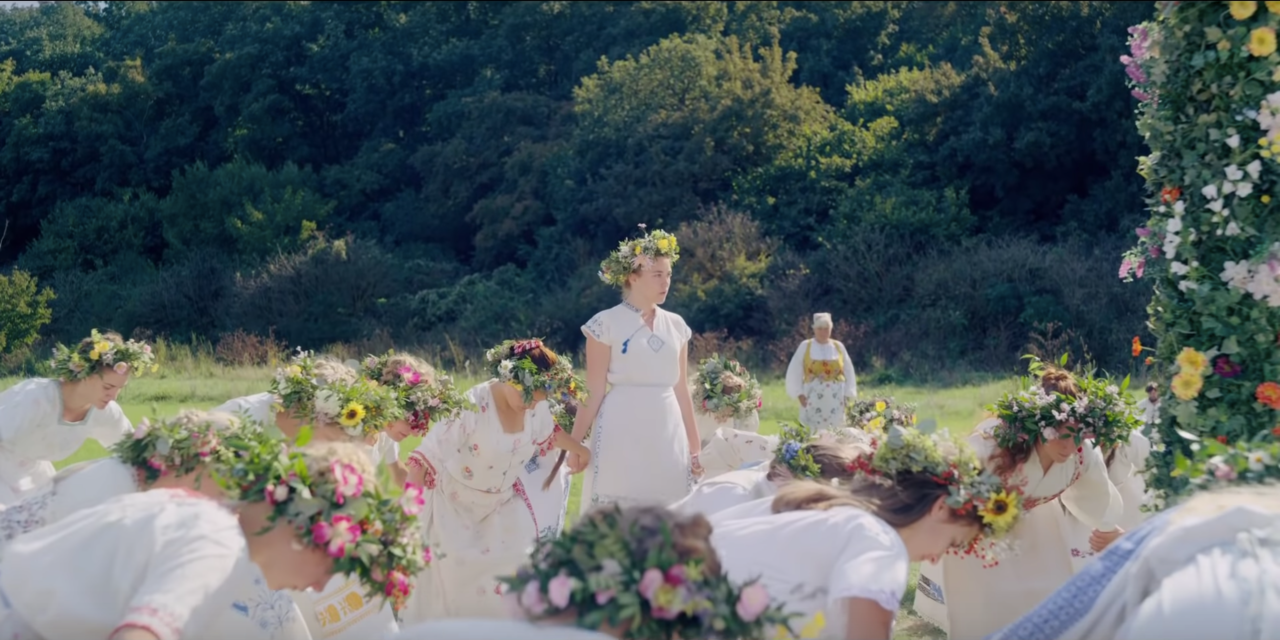Horror movie Midsommar has officially arrived in theaters. As the follow-up to Hereditary, it cements writer/director Ari Aster as a talented contemporary horror auteur. Check out our review below, and read about how Aster dealt with the challenges of shooting a horror movie in broad daylight, as well as the deleted scene he hated to cut.
Writer and director Ari Aster has quickly developed a consistent motif, at least across his two feature-length movies so far (Hereditary, and now, Midsommar): grief, and the destructive ways that people deal with it. But Midsommar is far from a re-hashing of the story in Hereditary, even if it brushes many of the same themes and subjects--tragedy, family, inevitability, cults, and beyond.
Where Hereditary was often almost unbearably dark, Midsommar is the opposite: unbelievably bright, almost always lit in full sunlight thanks to Sweden's midnight sun, the villagers' breezy white cotton frocks and vibrant wildflowers contrasting with flashes of dark memories and gruesome, undisguised violence. If anything, it makes Midsommar just as unsettling as Hereditary was, if not moreso.
Like its predecessor, Midsommar begins with tragedy. But the loss that Dani (Florence Pugh) experiences doesn't stay in the story's forefront for long, as her one-sided relationship with Christian (Jack Reynor) forces her to bury her feelings in constant subservience to his selfish needs. Their toxic relationship is highly relatable; he wants out, but feels obligated to stay with her, while her constant worry about losing him makes her feel pathetic. It's easy to root for her, although Christian isn't without sympathy too (some might argue with this, but what's his crime really? Being wishy-washy?).
Midsommar is a slow burn. The opening act follows Dani and Christian, along with Christian's friends Mark (Will Poulter), Josh (William Jackson Harper), and Pelle (Vilhelm Blomgren), as they plan a trip to Pelle's home village in remote Sweden. Dani eventually becomes attached to said trip, mainly out of pity, which presents a potent recipe for resentment.
Things turn more and more sinister as the midsummer festival in Pelle's village progresses through its 9-day celebration. It's a predictable horror movie structure, but in this case, it's to the movie's benefit, as that predictability is what keeps us anchored during the film's long-feeling 140-minute runtime. Midsommar spends exhausting amounts of time simply observing the cult's alien customs and rituals; as the audience, you'll feel as trapped among all the feasts and sermons as the village's foreign visitors do. There is beauty to much of it, but that beauty only makes the horror more terrifying as it seeps in and eventually grows to dominate the film.

Midsommar also has a strong psychedelic element; in many ways, it's like one extremely long, inescapable bad trip. If you've ever taken too many shrooms and freaked out for a few hours, you'll understand how Dani and Christian feel as they're repeatedly fed hallucinogenics while events get stranger and stranger. Visually, the movie marks their tripping perceptions with the pulsing and twisting of the natural world around them; trees and grasses beat like hearts, while flowers grow and shrink like they're taking breaths. It all adds to a sense of uneasy unreality that pervades the movie, along with incongruously beautiful music that builds and swells as gruesome acts play out onscreen.
Pugh ably portrays a character who's so starved for empathy that she effectively becomes helpless, a person you want to shake awake. As Christian, Reynor barely disguises his Irish accent, although it's not too distracting--and he does a fantastic job walking the line between a flawed protagonist and a total dickhead. Midsommar is often funny, though always with a threatening subtext; Poulter is the comic relief, but the kind who pisses on a ceremonial tree and then wonders what the big deal is. You cringe, you laugh, and then you dread what's going to happen next. William Jackson Harper, well known for his role as Chidi on The Good Place, is underused, his character unfortunately relegated to the sidelines.
Midsommar has a strong running throughline about reflection--on one's self, in one's surroundings, and beyond. Watch for mirrors throughout the movie, from the opening scene to the very end. Many shots are cleverly framed so that characters appear in reflections, and there's reciprocity in nearly every scene, from the way actors are arrayed to the quick cuts that serve to contrast two disparate events or scenes. Like Hereditary, Midsommar begs for repeat viewings.
It will also be fascinating to learn what kind of research went into the movie. The remote Swedish village doesn't appear to be a real place, but the cultists' iconography, beliefs, and rituals seem so fleshed out that they must be based somewhere in reality. These rituals go to some truly disturbing places, and like its predecessor, the violence Midsommar presents is undisguised by familiar movie magic like obfuscatory editing or over-the-top special effects. Aster's realistic onscreen portrayals of stark brutality and death will make you squirm in a way that few horror movies these days do. A strong throughline of body horror, from limbs growing roots during mushroom-fueled hallucinations to the dissections hinted at in trailers, adds further to the discomfort and terror pervading this movie.

Midsommar is an incredibly strong follow-up to Hereditary, and together, these two auteristic, art-house horror films cement Ari Aster as one of the most talented filmmakers currently working in the genre. Midsommar won't be for everyone--it's not exactly the commercial-minded horror blockbuster we're used to seeing in the middle of summer. But for those who don't mind a strange and terrifying trip, Midsommar is a movie to watch again and again and again.